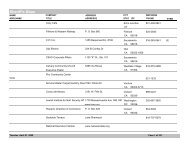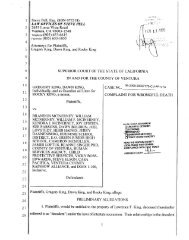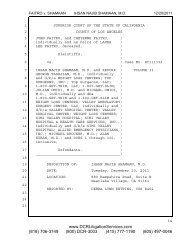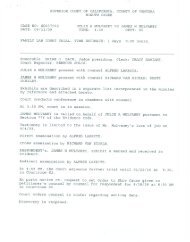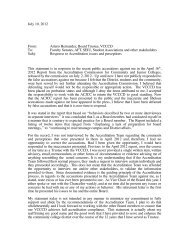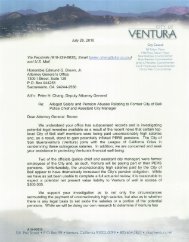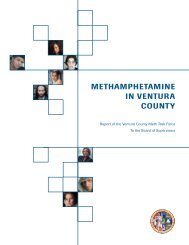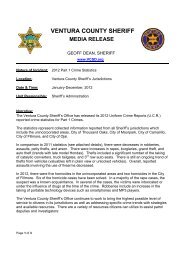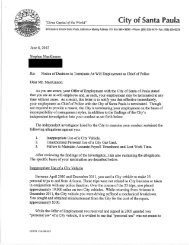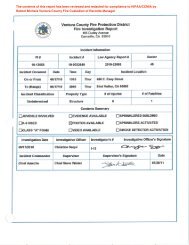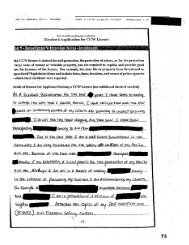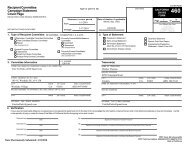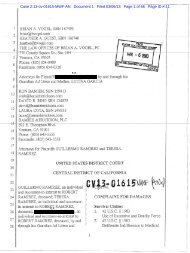Metrolink peer review report - Ventura County Star
Metrolink peer review report - Ventura County Star
Metrolink peer review report - Ventura County Star
Create successful ePaper yourself
Turn your PDF publications into a flip-book with our unique Google optimized e-Paper software.
METROLINK COMMUTER RAIL SAFETY PEER REVIEW PANEL<br />
Final Report – January 5, 2009<br />
Issue Papers<br />
and without this practice, the crewing costs could rise dramatically in the industry since an additional set of crews<br />
would be required for one of the peak periods.<br />
The concern of the FRA and the industry is: What are the employees doing during their rest period and are they<br />
in fact resting during their off -hours? Is the way the split shifts are set up contributing to fatigue by upsetting an<br />
employee’s circadian sleep patterns?<br />
Currently there is insufficient data to show that the split shift assignments are a contributing cause in human<br />
factor accidents. The FRA and industry professionals do not believe they have enough information to make a<br />
determination on the effect of split shift assignments on fatigue.<br />
Congress has an alternate allowance as part of the railway act (HR 2095) to defer the compliance of the commuter<br />
rail industry to new Hours of Service requirements through an RSAC process, in deference to the very different<br />
operating conditions of most commuter train and engine crews.. The new Hours of Service 8 requirements will be<br />
applied to the freight industry in July 2009. In addition, railway labor has indicated that they may not support the<br />
change in Hours of Service including elimination of split shift assignments.<br />
Currently FRA plans to address this issue as part of its 2009 Docket for the RSAC. FRA will submit a task<br />
statement of work in April 2009 for acceptance by the RSAC. That will start an 18 months clock for coming up<br />
with any alternative Hours of Service regulations for commuter rail and intercity passenger rail.<br />
FRA also has demonstration projects underway that, similar to aviation programs, attempt to develop data on<br />
near miss occurrences as a means of developing better data on root causes of incidents. Such data development<br />
and root cause analysis are critical to developing truly effective accident prevention strategies.<br />
Many factors enter into human factors analysis. For example, SCRRA and other railroads provide rest facilities for<br />
employees’ use between-shift respites. The use of these facilities by employees with split shift assignments should<br />
be periodically <strong>review</strong>ed. SCRRA's general work environment is similar to other commuter rail agencies in the<br />
United States located in urban areas: high cost real estate in major metropolitan areas of Los Angeles, New York,<br />
Washington DC, Boston, and others means that employee travel time to and from work assignments can be<br />
substantial. Also, seniority plays a major role in where employees can hold job assignments; low seniority<br />
employees, for example, have little or no choice in their work assignment locations.<br />
The Panel recommends that SCRRA participate in the FRA RSAC process regarding this practice. The Panel also<br />
recommends that SCRRA conduct a short term <strong>review</strong> of its major human factors conditions that may improve or<br />
increase risk, including fatigue, and the impact of Hours of Service and Split Shifts and other rules whose<br />
application may require short term changes, in addition to complying with the current and pending FRA rules<br />
and regulations. To the extent that the <strong>review</strong> of major human factors conditions requires cooperation of<br />
SCRRA’s contractors because they are the direct employers of the individual employees subject to the study, the<br />
Panel recommends that SCRRA take all steps available to it to require those contractors to cooperate with the<br />
study.<br />
8 Commuter Rail and intercity passenger rail has to comply with the current Hours of Service regulations in law 49 CFR 228.<br />
62



